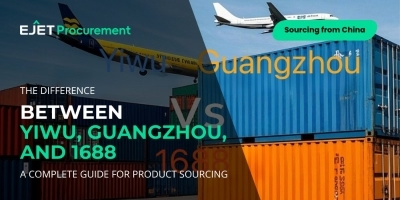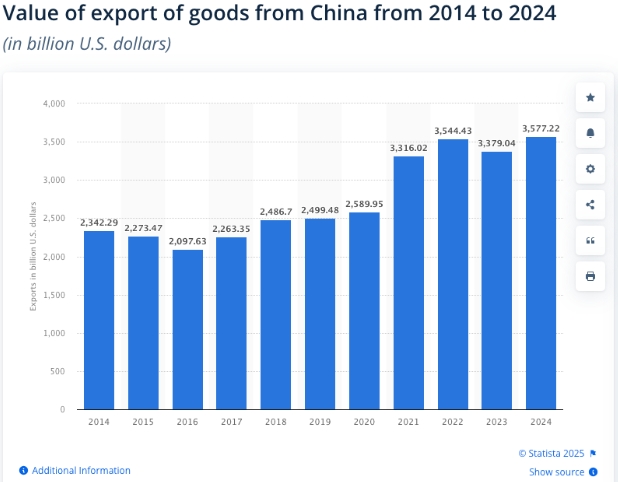Where is the Best Place for Product Sourcing: Yiwu Vs. Guangzhou Vs. 1688


Product sourcing is a crucial step for every retailer and wholesaler. Besides finding a reliable supplier, choosing the right location can make or break your success.
China is a popular destination for sourcing products due to its vast manufacturing capabilities. But where exactly should you source from?
Yiwu, Guangzhou, and 1688 are three prominent options. Each offers unique advantages and challenges. Appealing to retailers to buy in bulk.
This comprehensive guide will explore these options in detail. We'll help you decide the best place for your product sourcing needs.
Product sourcing isn't an easy step. It involves finding and acquiring products to sell. You should balance price, quality, time, and type.
There are different methods for sourcing products:
1. Buying directly from manufacturers(Like visiting the Yiwu International Trade City).
2. Finding products through online platforms(Like sourcing from Alibaba).
3. Partnering with sourcing agents(Like EJET Procurement).
Each approach offers unique benefits and challenges. Understanding these can help businesses make informed decisions about how to source their products efficiently.
Selecting the right sourcing place impacts cost, quality, and supply chain efficiency. Businesses must consider these factors for a competitive advantage.
Several key elements influence this decision:
Product Availability and Diversity
Cost-Effectiveness in Pricing
Quality Control and Standards
Ease of Shipping and Logistics

The fact that retail giants are sourcing from China is not a coincidence. According to Statista, China exported approximately $3.58 trillion worth of products in 2024.
China is the world's manufacturing hub. It stands out as a primary source for many businesses due to its vast production capacity. The country's infrastructure supports mass production efficiently.
Another significant reason to source from China is cost-effectiveness. China's labor market provides competitive pricing, making it possible to maximize profit margins. This affordability, paired with robust manufacturing capabilities, is unmatched.
Key factors making China an attractive sourcing destination include:
Competitive Pricing
High Production Capacity
Diverse Product Offerings
Strong Logistics System
Open Trade Policies
Each of these factors contributes to China's prominence in global product sourcing.
_1754289272894.jpg)
Yiwu is renowned globally for its vibrant wholesale market. Known as the "World’s Largest Small Commodity Market," it attracts buyers from every corner. For product sourcing, the city is a hub for low-cost goods.
Its strength lies in its massive variety and quantity of products. The city's market spans thousands of shops. Each shop offers something unique. These advantages make Yiwu a preferred choice for sourcing small commodities.
Yiwu specializes in small consumer goods. The market hosts an array of categories catering to various consumer needs. From fashion accessories to electronics, the choices are vast.
Buyers will find an array of everyday products. Items are often grouped into distinct sections for easy navigation. Yiwu's market diversity ensures buyers can fulfill wide-ranging product requirements.
Wide Selection of Low-cost Items
Easy Access to Small Order Quantities
Excellent Networking Opportunities
Language Barriers
Variable Product Quality
_1754289304336.jpg)
Guangzhou is China's trade capital and the "Canton Fair City." This vibrant city is known for its international trade exhibitions, drawing worldwide buyers. It's a bustling metropolis with a strategic location near Hong Kong.
It excels due to its robust infrastructure and diverse business ecosystem. The city offers an impressive array of wholesale markets.
Guangzhou boasts a wide range of products spanning multiple industries. Known for its electronics and textiles, it also showcases fashion and machinery. Buyers can find an extensive selection of high-quality goods.
The city's marketplaces provide competitive options for diverse product categories. Whether you are looking for electronics or automotive parts, Guangzhou has it all.
Access to High-quality Products
Strong Logistics Network
Frequent International Trade Events
Higher Product Costs
Complex Regulatory Environment
_1754289323499.jpg)
1688 is a dominant online platform for sourcing products directly from manufacturers in China. It offers a digital marketplace connecting suppliers and buyers seamlessly. The platform is part of Alibaba's ecosystem, serving the Chinese domestic market.
Additionally, 1688 hosts a comprehensive array of products across numerous categories. From consumer electronics to fashion apparel, the options are vast. This variety makes it a go-to platform for diverse sourcing needs. Buyers can browse thousands of listings with ease.
Convenience of Online Access
Large Variety of Suppliers
Cost-effective Options
Language Barriers (Mostly in Chinese)
Quality Assurance Issues
Pricing is a major factor in product sourcing. Yiwu, known for small commodities, offers competitive prices due to bulk purchasing. Guangzhou's pricing can vary. It often depends on product complexity and brand value.
In contrast, 1688 provides diverse pricing options, often lower due to direct manufacturer access.
Yiwu: Low-cost bulk items
Guangzhou: Variable, often mid-range
1688: Wide, often factory-direct pricing
Quality varies across Yiwu, Guangzhou, and 1688. Yiwu's products are known for affordability, but quality can be inconsistent. Guangzhou is famed for higher-end goods, with several premium manufacturers.
1688's quality depends on supplier reliability, necessitating careful vendor vetting.
Yiwu: Low to medium quality
Guangzhou: Generally higher quality
1688: Variable quality, check supplier ratings
Accessibility impacts sourcing logistics greatly. Yiwu and Guangzhou are well-connected, with established transport networks. They cater to international buyers efficiently.
1688, being online, offers global access but requires familiarity with Chinese shipping practices.
Yiwu: Strong wholesale logistics
Guangzhou: Comprehensive shipping options
1688: Convenient, but requires logistics planning
|
Destination |
Pricing |
Quality |
Logistics |
|
Yiwu |
Low-cost bulk items |
Low to medium quality |
Strong wholesale logistics |
|
Guangzhou |
Variable, often mid-range |
Generally higher quality |
Comprehensive shipping options |
|
1688 |
Wide, often factory-direct pricing |
Variable quality, check supplier ratings |
Convenient, but requires logistics planning |
Using a sourcing agent can save time and reduce risks. This ensures smooth transactions and quality products.
Sourcing agents simplify product sourcing. They help navigate complex markets and online platforms. Agents connect businesses with reliable local suppliers.
For EJET as an example, our advantages:
1. Expertise in local market trends.
2. Efficient negotiation and communication with suppliers.
3. Strict quality control throughout the entire process.
4. Fast and secure international logistics.
5. 90-day credit payment period.
Note: A good agent aligns with your product sourcing goals and business strategy. Choose the right one.
Choosing between Yiwu, Guangzhou, and 1688 depends on your unique requirements. Each product sourcing location offers distinct advantages and challenges.
Understanding the nuances of each option can lead to success. Your decision should align with your business goals and target market.
Partnering with a China sourcing agent can streamline your efforts. They bring valuable expertise and connections to the table. A skilled agent like EJET Procurement simplifies processes, ensuring efficient and risk-free product sourcing.
Consider hiring one to enhance your business operations and meet your sourcing needs effectively. Want to try? Contact us to get a free quote!
Your trusted partner for sourcing from china.





